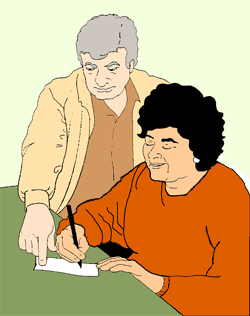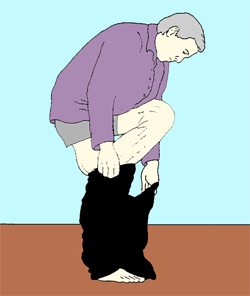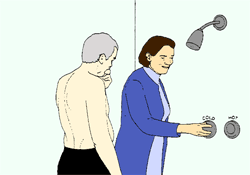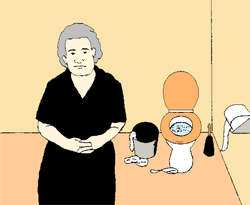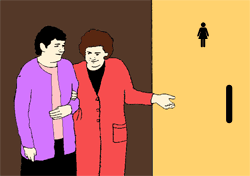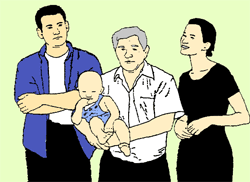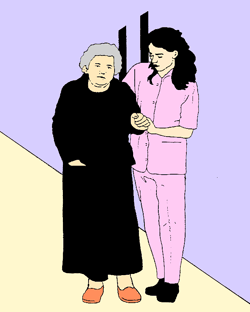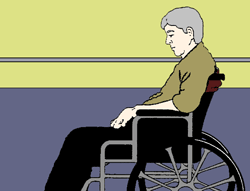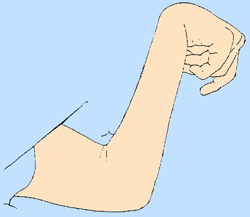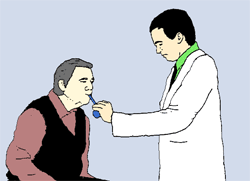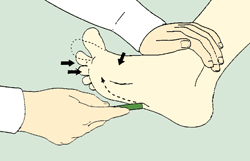We are still in the process of downsizing, but now only weeks away from completing
the eventual move to our `Forever Home`. Packing belongings, organising and buying
a few more appliances for the flat has turned out quite stressful in itself. Rick has been
trying hard to be helpful throughout it all, but is showing signs of distress with all the
changes necessary. His mood had improved when we came back from visiting his
sister in Bulgaria, but things are taking a negative turn once more as we are getting
closer to the actual move from our three bedroom house. His memory is suffering and
getting worse.
On top of it all we had to attend an assessment of his disabilities today where he was
put under an awful lot of stress, having to answer a myriad of questions about his
physical and mental abilities. Not been able to understand some of the trick questions
that were thrown at him by an unsympathetic assessor made him agitated and very
upset. The evaluation of his abilities took over an hour and his mood was getting more
and more angry by the minute. Myself and his daughter were allowed to be present, but
it didn`t seem to calm his mind having us there for moral support. Every answer was
fed into a computer form that is then sent to the Works and Pensions Department for
their approval. They will ultimately decide weather or not he is awarded his Personal
Independence Allowance or will be told that he has to apply for a job, despite of his
mental and physical problems. The assessor today had no medical background to be
able to determine Rick`s disabilities, and the decision is going to be in the hands of
pencil pushers in a separate government department. At the end of today`s session we
were ushered out of the meeting and told to await the decision to be sent to us within
the next 14 days. Rick is very confused and can not understand the waiting for the
decision to be made by someone else. We have no confidence in the benefits system
of this country and are dreading the outcome already. Nobody can see what I have to
go through every day in looking after someone with mental as well as physical
problems; and asking a mentally impaired person trick questions and questions that
are designed to entrap and confuse him will never give the full extend of his problems.
We felt quite gutted and depressed after this meeting today. Rick was left feeling
exhausted and worn out, so I had to take him straight home where he fell asleep in
his comfy armchair for several hours. The benefit, if we do ever qualify for it, would be
helpful in managing his conditions and would give us more scope in the way we can
look after his needs in the future. The stress he was put under today was, in my opinion
quite unnecessary. It left me angry and worried for our future, when we should now be
looking forward to moving to our new home.
All that I can hope for is that the home move can be made as painless and without too
much stress for Rick when we have friends help us with the move itself. Ideally, I`d
like to send Rick away for the day, so that the move itself could be swift and without
him getting worried about his precious belongings. A wish I know can not be made to
come true, nonetheless. Therefore, the moving day will also be stressful for me when
I have to take care of him as well as give a hand with moving furniture and appliances.
I wish it to be over and done with already, so not looking forward to the actual day now.
the eventual move to our `Forever Home`. Packing belongings, organising and buying
a few more appliances for the flat has turned out quite stressful in itself. Rick has been
trying hard to be helpful throughout it all, but is showing signs of distress with all the
changes necessary. His mood had improved when we came back from visiting his
sister in Bulgaria, but things are taking a negative turn once more as we are getting
closer to the actual move from our three bedroom house. His memory is suffering and
getting worse.
On top of it all we had to attend an assessment of his disabilities today where he was
put under an awful lot of stress, having to answer a myriad of questions about his
physical and mental abilities. Not been able to understand some of the trick questions
that were thrown at him by an unsympathetic assessor made him agitated and very
upset. The evaluation of his abilities took over an hour and his mood was getting more
and more angry by the minute. Myself and his daughter were allowed to be present, but
it didn`t seem to calm his mind having us there for moral support. Every answer was
fed into a computer form that is then sent to the Works and Pensions Department for
their approval. They will ultimately decide weather or not he is awarded his Personal
Independence Allowance or will be told that he has to apply for a job, despite of his
mental and physical problems. The assessor today had no medical background to be
able to determine Rick`s disabilities, and the decision is going to be in the hands of
pencil pushers in a separate government department. At the end of today`s session we
were ushered out of the meeting and told to await the decision to be sent to us within
the next 14 days. Rick is very confused and can not understand the waiting for the
decision to be made by someone else. We have no confidence in the benefits system
of this country and are dreading the outcome already. Nobody can see what I have to
go through every day in looking after someone with mental as well as physical
problems; and asking a mentally impaired person trick questions and questions that
are designed to entrap and confuse him will never give the full extend of his problems.
We felt quite gutted and depressed after this meeting today. Rick was left feeling
exhausted and worn out, so I had to take him straight home where he fell asleep in
his comfy armchair for several hours. The benefit, if we do ever qualify for it, would be
helpful in managing his conditions and would give us more scope in the way we can
look after his needs in the future. The stress he was put under today was, in my opinion
quite unnecessary. It left me angry and worried for our future, when we should now be
looking forward to moving to our new home.
All that I can hope for is that the home move can be made as painless and without too
much stress for Rick when we have friends help us with the move itself. Ideally, I`d
like to send Rick away for the day, so that the move itself could be swift and without
him getting worried about his precious belongings. A wish I know can not be made to
come true, nonetheless. Therefore, the moving day will also be stressful for me when
I have to take care of him as well as give a hand with moving furniture and appliances.
I wish it to be over and done with already, so not looking forward to the actual day now.





